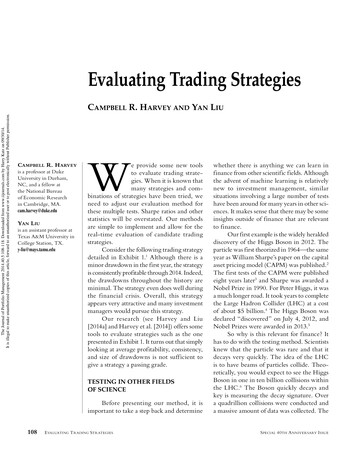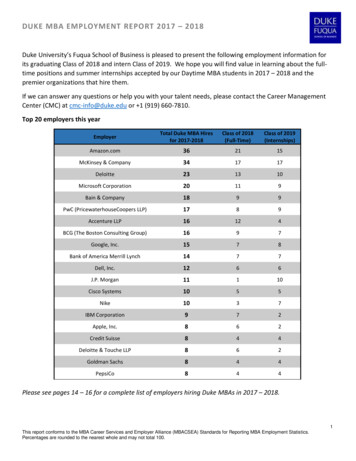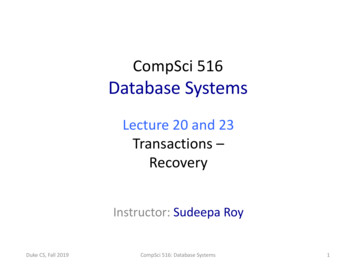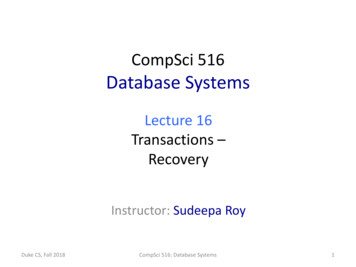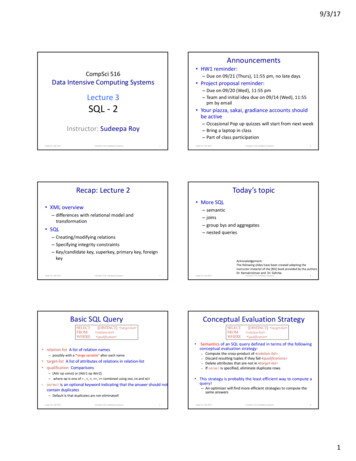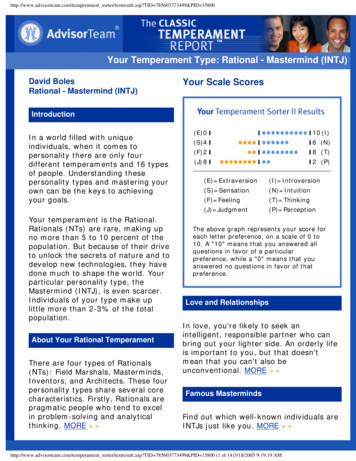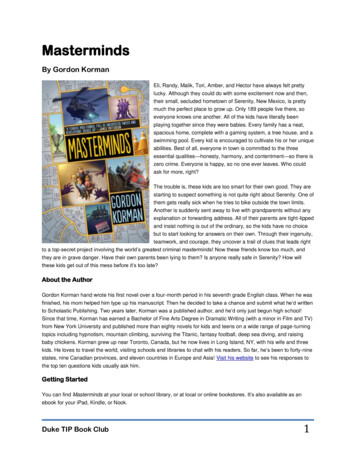
Transcription
MastermindsBy Gordon KormanEli, Randy, Malik, Tori, Amber, and Hector have always felt prettylucky. Although they could do with some excitement now and then,their small, secluded hometown of Serenity, New Mexico, is prettymuch the perfect place to grow up. Only 189 people live there, soeveryone knows one another. All of the kids have literally beenplaying together since they were babies. Every family has a neat,spacious home, complete with a gaming system, a tree house, and aswimming pool. Every kid is encouraged to cultivate his or her uniqueabilities. Best of all, everyone in town is committed to the threeessential qualities—honesty, harmony, and contentment—so there iszero crime. Everyone is happy, so no one ever leaves. Who couldask for more, right?The trouble is, these kids are too smart for their own good. They arestarting to suspect something is not quite right about Serenity. One ofthem gets really sick when he tries to bike outside the town limits.Another is suddenly sent away to live with grandparents without anyexplanation or forwarding address. All of their parents are tight-lippedand insist nothing is out of the ordinary, so the kids have no choicebut to start looking for answers on their own. Through their ingenuity,teamwork, and courage, they uncover a trail of clues that leads rightto a top-secret project involving the world’s greatest criminal masterminds! Now these friends know too much, andthey are in grave danger. Have their own parents been lying to them? Is anyone really safe in Serenity? How willthese kids get out of this mess before it’s too late?About the AuthorGordon Korman hand wrote his first novel over a four-month period in his seventh grade English class. When he wasfinished, his mom helped him type up his manuscript. Then he decided to take a chance and submit what he’d writtento Scholastic Publishing. Two years later, Korman was a published author, and he’d only just begun high school!Since that time, Korman has earned a Bachelor of Fine Arts Degree in Dramatic Writing (with a minor in Film and TV)from New York University and published more than eighty novels for kids and teens on a wide range of page-turningtopics including hypnotism, mountain climbing, surviving the Titanic, fantasy football, deep sea diving, and raisingbaby chickens. Korman grew up near Toronto, Canada, but he now lives in Long Island, NY, with his wife and threekids. He loves to travel the world, visiting schools and libraries to chat with his readers. So far, he’s been to forty-ninestates, nine Canadian provinces, and eleven countries in Europe and Asia! Visit his website to see his responses tothe top ten questions kids usually ask him.Getting StartedYou can find Masterminds at your local or school library, or at local or online bookstores. It’s also available as anebook for your iPad, Kindle, or Nook.Duke TIP Book Club1
While You’re ReadingEvery good story is full of captivating characters, timeless and timely themes, significant settings, pivotal plot points,and vivid vocabulary that combine to engage our brains and our hearts. In this section of the website, you will findactivities that invite you to dig deeper into each of these literary elements for a better understanding and enjoyment ofthe book.To aid your investigation, save our “Writing While You Read” guide (see pages 20 and 21), with helpful tips onkeeping a reading journal and annotating a book while you read.Respond to the following prompts in your reading journal as you read chapters 1-9of Masterminds: The key way a writer helps his or her readers connect with a story is through its characters. Which qualities,behaviors, and choices do you think make some characters more appealing than others? To help you answerthis question with specific evidence from the book, use the Character Grid you’ll find on pages 22 and 23 below(and you can make extra copies of page 23 if you need them). Tuck it inside your book, and, each time youmeet a new character, take a minute to jot down the name and your initial observations about him or her onyour Character Grid. Be sure to revisit your Grid every few chapters or so, too! There may be more ideas youwant to add as you get to know each character better. Even though their personalities are very different, Eli and Randy are best friends and spend most of their freetime together. Why do you think these two get along so well? Find some specific evidence in the book tosupport your answer. Eli and his friends live in the tiny town of Serenity, New Mexico. The town’s motto is “America’s IdealCommunity” because, as their parents constantly remind them, they all enjoy “so much quality of life. . .in sucha small package” (7, 10). How would you describe Serenity? What are this town’s most appealing features?Although this book’s setting is fictional, in what way(s) does Serenity feel familiar? Use a Venn diagram (seepages 24 and 25 below) to compare and contrast Serenity with your hometown. Be careful to note anything thatmakes Serenity seem unusual or unrealistic. None of the Serenity kids has ever been allowed to travel, but, according to Eli, they have all “heard about thebigger towns and—even worse—cities. They stink of garbage and everything’s crumbling, and crime is so badthat nobody can trust anybody else. People spend their time in fear, hunkered down behind locked doors andalarm systems” (9). In Serenity, on the other hand, none of these problems exist because everyone abides bythe “three Essential Qualities of Serenity citizens—honesty, harmony, and contentment” (9). How would youdefine each of these three qualities? How might encouraging citizens to prioritize these qualities lead to a safer,cleaner community? Do you think what Eli and his friends have been taught about the outside world isaccurate? Why (or why not)? The Surety, or the “Purple People Eaters” as all the kids call them, are a bit of an anomaly in a tiny town whereeveryone else knows one another so well. The kids constantly see Purples walking around town in their “deepblue-violet” uniforms (63), but the guards always “keep to themselves, which makes them kind of nameless andfaceless” (17-18). They are supposed to be guarding the Serenity Plastics Works, but, when Eli gets sick at theoutskirts of town, the Purples swoop down in their “military-style helicopter” to rescue him (12). Why do youDuke TIP Book Club2
think the Surety are so quiet and mysterious? In what way(s) are their behavior and equipment unusual forsmall-town law enforcement? Malik wisely reflects on whether theRules of Contentment, which he andhis friends have been taught tomeditate on daily, even apply outsideSerenity: “We should be the postertown for spoiling your kids. Maybethat’s why Contentment is one of ourmain classes at school. I wonder howthey teach Contentment in placeswhere kids don’t have as much stuff”(38). What do you think Malik meansby this? What effect does “stuff” haveon one’s contentment? Does havingmore typically lead one to be more,or less, content? Why? When he finds out that his dad and Dr. Bruder have been drugging him, trying to make him forget aboutRandy’s note and the Boston Tea Party Web site, Eli has an epiphany (or moment of sudden and harshrealization). He suddenly sees his father, and his own future, as they really are: “Trust me, there is no feelingquite so lonely as learning you have no one who will always be on your side. It’s the ultimate lonelinessbecause you are exactly that: alone. My sole ally, my only friend, is my mind. I have to keep it clear, becauseall I have now is my understanding of what’s happening to me” (102). Eli realizes that, if he wants to survive, hemust fend for himself. That would be a pretty scary feeling for a thirteen-year-old.In what way(s) is Eli’s epiphany similar to those we have seen other characters experience? Think, for example,about Ford Falcon sitting under the Shelter Tree after she loses her family in The Scavengers or Tree Earstanding beside the Rock of the Falling Flowers with his master’s broken vases in A Single Shard. (If you havenot read these books with the TIP Book Club in the past, feel free to substitute other, familiar characters thatcome to mind!) How do these moments of realization signal a major change in the characters’ outlook on life?Sense of responsibility? Movement toward adulthood? Did you notice that the U.S. Pledge of Allegiance kids recite in Serenity, New Mexico, is different from the oneyou’ve learned? At the end of the pledge, they say, “with unity and gladness for all” instead of “with liberty andjustice for all” (112). How does this edit change the Pledge’s meaning? Why would adults in Serenity make thischange? Considering our nation’s history and collective identity, do you think the words “unity and gladness” areworthy substitutions for “liberty and justice”? Why (or why not)?Respond to the following prompts in your Reading Journal as you read (or re-read)Chapters 10-18 of Masterminds: As Eli, Tori, Malik, and Hector are flying their webcam-enhanced kite in the park, trying to take aerial photos ofthe Plastics Works, Tori has an unsettling epiphany of her own. She realizes, “The day is sunny and blustery—at least blustery for around here. Sometimes the prevailing winds are pushed south toward us by the mountainsof Colorado. Of course, that information comes from school, so it isn’t necessarily true. For all we know, someDuke TIP Book Club3
mythological wind god blows over Serenity through titanic lips” (137). Although she tries to brush it off with a bitof humor, Tori clearly isn’t sure whom or what she can believe anymore. In what way(s) are we dependent onothers, especially as young people, to help us establish the truths of how our world works and how we fit withinit? Why is it so easy to be misled? Mr. Frieden, the Bruders, the Pritels, the Laskas, and the Amanis all take very different approaches to parentingand their relationships with their children. How would you describe the family dynamics in each narrator’shousehold? Which parent(s) and home most closely resemble your own? How so? When they sneak into the Plastics Works, Eli, Tori, Malik, and Hector make a big discovery in the factory’sbasement: the Project Osiris. What is this project, exactly, and why do you think it is named after the Egyptiangod of the dead? What surprises you about the project the kids’ parents have been working on in the factory’ssecret conference room? If you were Eli, Tori, Malik, or Hector, how would you feel about being experimentedon without your consent in this way? Once Eli, Tori, Malik, and Hector start figuring out what’s really going on in Serenity, they start combing overtheir daily lives, conversations with parents, and memories, looking for clues they may have overlooked. Whydidn’t they notice something wasn’t quite right in Serenity? Were their parents too eager to keep them happywith their lives? What aren’t their parents telling them? Flip back through the chapters you have read so far and,in your reading journal, jot down any scenes, conversations, or memories you think hint the grown-ups arehiding something. In literary studies, we call these clues foreshadowing. Foreshadowing gives readers thefeeling that a surprising event or change is about to take place in the story. By the beginning of chapter 15, Amber is thoroughly confused about what has happened to her friendship withTori: “I can’t quite explain it. Nothing’s changed. We haven’t had a big fight—it’s nothing like that. It’s just thatshe’s never got time for me anymore. Even when we’re together, it always seems like her mind is somewhereelse” (181). Amber worries that she and Tori won’t be able to fix whatever has gone wrong in their relationship.Friendships change a lot, especially when people are young. What are some reasons friendships change or fallapart as kids get older? Have you ever had an experience like Amber’s? How did it make you feel? How did youdeal with the change? Everyone who sneaks into the factory makes a pact to keep what they found a secret. Tori keeps her promise,but she really struggles with not telling Amber what she and the others have learned: “We’re closer than sisters,and I know something that explains everything about her life and her world. And what do I tell her? Nothing.Some friend I am” (220-21). To make matters worse, Amber can tell Tori is keeping a secret from her. Theirrelationship becomes very strained. Have you ever had to keep a secret from someone you love very much?What was that like? Why must we sometimes keep secrets to protect those we love?Duke TIP Book Club4
Eli, Tori, Malik, and Hector areunder an intense amount of pressure oncethey know the truth about the ProjectOsiris. Hector feels like he’s “not evenhuman” (203). Meanwhile, Malik worrieswhat will happen if the adults find out whatthey know (206). The kids not only have tocome to terms with how they were bornand why, but also they have to find a wayto escape before one of them is “weededout” (223). These circumstances force thekids to grow up fast. What are some otherexamples, either from history or your ownexperience/observations, of occasionswhen kids have been forced to grow up tooquickly due to difficult circumstances? How did the kids manage to survive? How are kids who must becomeresponsible for themselves at an early age different as they grow into adults? Surprisingly, it turns out that Randy, the one kid who frequently gets into trouble, is not even one of the criminalclones. Up until he is sent away, he has been raised in exactly the same way as the eleven special kids inSerenity, though. How do you think raising the children in such a carefully controlled environment has affectedtheir character and personality development? Does Randy’s behavior give you any indication about the overallsuccess of the Project Osiris?Respond to the following prompts in your reading journal as you read (or re-read) chapters19–27 of Masterminds: Amber is the last friend to learn the truth about her parents and the Project Osiris, and, in many ways, she is theangriest (249). After all, she has committed herself to the Serenity way of life and spent most of her time livingup to the responsibility of being a teacher’s kid. In reality, her parents have been expecting her to do things thehonest, harmonious, contented way while doing the opposite themselves. Moreover, she has the DNA of acriminal, yet she’s the one who has been doing the right things! The irony of this situation is difficult for her toaccept.In many ways, Amber has been the most ethical, conscientious person in town. Back in chapter 2, she hadbeen so hard on herself for temporarily keeping a secret from her parents even though all she’d done wasread USA Today: “It just confirms what we learn in Contentment—that the mind has a way of tricking you intothinking you’re doing the right thing when you’re not. The truth is, I was keeping a secret. It’s a slippery slope”(32). Later, Amber had refused to tell on Tori “because, in Serenity, we always keep our word” (187). Now sheknows her parents, and every other adult in Serenity, have been lying about who she is and why she is there.Her entire life has been one big lie! As a result, Amber begins to rethink every principle she’s ever held dear.Why is it so difficult for most people to live in the real world without keeping secrets and lying? Are there anyaspects of the kids’ life in Serenity that make being honest easier, or do you think honesty is more a matter ofindividual commitment and willpower? Be sure to explain your answer thoroughly and give specific examples forsupport.Duke TIP Book Club5
Each chapter of Masterminds is voiced by a different narrator (or speaker) who is sharing his or her first-personaccount of the story as it unfolds. There are five different narrators: Eli, Tori, Amber, Malik, and Hector. At thispoint in your reading, you should be getting a good feel for each kid’s distinct voice, storytelling style, andpersonality. In your reading journal, create a multi-circle Venn diagram (see pages 24 and 25 below) to help youvisualize the similarities and differences between these narrators. What qualities make their storytelling stylesunique? How do they feel about their parents and the idea of leaving home? What are their strengths andweaknesses? What are their hopes and fears? Look back over the notes you’ve made on your character grid(see pages 22 and 23 below) for ideas. Once your diagram is complete, step back and consider why Eli, Tori,Amber, Malik, and Hector make such a strong team. Mrs. Delaney, the water polo coach, is the only grown-up in town who seems interested in the kids’ well-being.She tells Eli, “You’re having a tough time. . .and that’s partly because you’re growing up without a mom. Ifthere’s ever anything you need to talk about, you can always depend on me” (108). However, once she realizesEli and his friends are trying to escape Serenity, she changes her mind. She helps the five of them get homefrom the outskirts of town undetected and immediately becomes “distant” (265). As a result, Eli, Tori, Amber,Malik, and Hector are left to come up with a solution to their problem all on their own, without adult guidance ofany kind. Does this seem unusual to you in any way? In the books you typically read, how often do childcharacters facing difficulty or danger receive advice and/or help from a trusted adult? How does the overalltone, or feeling, of a book differ when an adult is (or is not) involved? Eli, Tori, Amber, Malik, and Hector all seem to be naturally able to do things that ordinary kids cannot. What aresome of the unusual skills the five narrators have that could become assets if any of them turned to a life ofcrime? Look closely at the final four chapters, in particular, for evidence. Are the kids’ unusual skills evidence ofthe kids’ sharing DNA with criminal masterminds? How so? Near the end of the book—as Eli, Tori, Amber, Malik, and Hector make their final attempt to escape fromSerenity—one of them goes missing. The other kids are devastated and fear their friend has been killed. Do youagree? What clues from earlier in the book suggest this missing character’s quick thinking just may have savedhim or her after all? Most works of fiction follow a traditional plot pattern: (1) Introduce Problem, (2) Rising Action, (3) Climax, (4)Falling Action, and (5) Resolution of Problem. In what way(s) does Masterminds, which is the first in a bookseries, follow (or deviate from) this traditional plot pattern? When you read books in a series, do you prefer thateach book wrap up neatly---with a problem resolved and characters at rest—or do you prefer a cliff hanger thatleaves you so curious about what will happen next that you must start the next book as soon as possible? Why? Now that you’ve finished reading the book, look back over the notes you’ve made about the book’s fivenarrators on your character grid (see pages 23 and 24 below). In what way(s) has each narrator stayed true tohis or her core identity despite learning the truth about Serenity and having to break practically every rule just toescape? Based on your understanding of these five kids, do you think they are destined to become criminals?Why (or why not)? Sometimes it can be difficult to pinpoint a theme after reading only the first book in a series. Do you see anyhints so far about a message Gordon Korman may be trying to get across to readers? For example, how mightreading Masterminds change someone’s way of thinking about the challenges of growing up, parent-childrelationships, cloning, scientific experimentation, education, or community building?Duke TIP Book Club6
Getting to the RootEnglish is a living language. It changes andgrows all the time. One of the best ways tounderstand the history of the Englishlanguage and to unlock the meanings ofunfamiliar words is to learn Latin and Greekword parts. As you study biology, you willlearn more and more of these word parts, andonce you know them, you will begin torecognize them in all kinds of words—andyou'll find that your knowledge of those wordparts will help you decipher the meanings ofunfamiliar words.Roots are the "base" of plants, and Latin andGreek roots form the base of many English words. For example, the Latin root audi means “to hear.” How manymodern English words can you think of that include the root audi?Next, take a look at each word part below. Beside each part is a word from Masterminds containing that word part.You can find the word in context on the page number in parentheses. cens – census (82)mono – monotonous (148)hyper, vent – hyperventilating (156)claus, phob – claustrophobia (159)rog – surrogate (200)ex – exhort (287)1. Can you determine the meaning of the root from your knowledge of the word beside it?2. If not, think of other words that you know that also contain that root. What do those words have in common?Based on that common element, can you figure out the meaning of the root?If you're still stumped, check out this list of Latin and Greek roots.3.4. Now that you know the meaning of the root, how many words can you generate that use the root?5. Once you understand the meaning of the root, you'll find that even your understanding and appreciation offamiliar words will deepen and grow when you think about how that root works in those words.Duke TIP Book Club7
Words, Words, WordsMasterminds is full of great words. Below is a list of some of the words from the book that may be unfamiliar to you,along with the page number on which each word appears in the story. Be sure to follow the steps below for otherwords in the book that are new to you. enthuses (6) immaculate (9)pulsating (11)delirious (12)sedative (17)pax (27)tactic (27)synchs (36)solidarity (36)velocity (40)petrified (40)concede (47)codependent (56)dubiously (70)deprivation (99)audible (127)prominent (183)callous (200)decipher (208)conspiracy (231)debilitated (238)barrage (287)dehydration (299)precarious (302)adamant (312)Before you look these words up in a dictionary—or ask someone what they mean—try working through thefollowing steps:1.Generate a list of other words that share one or more of the same word parts. What do the words on the listhave in common? Are there any clues from those commonalities that you can use to help figure out themeaning of the unknown word? Hint: Some word parts—as they appear in English words—have multiplemeanings as we look back at the Latin and Greek, in part because of changes that have occurred in the wordsover the years. For example, does the "ped-" in "pedestrian" mean the same thing as the "ped" in"pediatrician"? Where there is possible confusion, context clues (see step 2) are extremely important.2.3.Go back and reread the word in its context. This context includes the sentence in which you find the word, butyou should also read one or two sentences both before and after the appearance of the word. What contextclues do you find that might unlock the meaning of the word for you?Make your best guess at the meaning of the word.4.Look up the definition in a dictionary. Be sure to also look for information about the word's origin. Thisinformation will often contain the Latin or Greek word from which the word is derived.5.How close was your guess?Duke TIP Book Club8
When You’ve FinishedOur world is full of connections—between people, places, and events. In this section of the website, you will findactivities that uncover some important connections—in American history, manufacturing, computer science, genetics,and psychology—between Masterminds and our world.Colonial American HistoryThe American Revolution Begins with a Splash in Boston Harbor!In Chapter 7 of Masterminds, as Eli is researching his Serenity Day Project online, there is “an enormous clap ofthunder” that causes his Web page on The Boston Tea Party to reload (86-87). In that moment, Eli realizes theBoston Tea Party wasn’t a “boring” planning meeting between American colonists and the British where “[t]ea wasserved” (85). In fact, “[i]t wasn’t a friendly affair; it was a rebellion” (87)! The Boston Tea Party resulted in a war forAmerican independence! Someone is clearly limiting Serenity kids’ access to information on the Internet, but why?What really happened in Boston Harbor on the night of December 16, 1773, and why shouldn’t Eli and his friendsknow about it?Activities Watch this video to find out why the Boston Tea Party happened and how it led to war with England. Why is itironic that this event became known as a “tea party”? Long before the Boston Tea Party,American colonists were feeling veryfrustrated by the unfair taxes KingGeorge III of England imposed onthem. Why do you think the SugarAct, the Stamp Act, the Tea Act,and the Townshend Acts led coloniststo declare “No taxation withoutrepresentation,” start callingthemselves patriots, and,eventually, claim independence fromEngland? Trace the key events leading up tothe Boston Tea Party on thistimeline and explore some of the actual newspaper articles, letters, and pamphlets that chronicled the clash ofbeliefs between the American patriots and the British monarchy during this time period. Meet the Sons of Liberty and other key players in the Boston Tea Party. In what way(s) was it dangerous forthese people to take such a drastic action? What might have happened if they’d been caught? Tour Boston’s Old South Meeting House (OSMH) where colonists met to protest unfair taxes and plan theBoston Tea Party. During the American Revolutionary War, the British took control of Boston and turned theOSMH into a barn and horse training center just to spite the American patriots. When America finally won theDuke TIP Book Club9
war, this historic site was carefully restored to its original condition. Today the OSMH serves as a museum andhosts a Boston Tea Party reenactment every year, so modern-day Americans can re-live this pivotal event intheir nation’s history. Did you know the British did not attempt to stop the Boston Tea Party? Find out why. Discover these little-known facts about the Boston Tea Party and the Revolutionary War in general. Learn why the colonists’ uprising against the British became known as The American Revolution and whatmakes it different from other well-known revolutions in world history. One of the most interesting things about war history is that it’s usually recounted from the winning side’sperspective. Do you ever wonder how British children learn about this period in their nation’s history? After all,their side lost the American colonies! Consider the American Revolution from the British point of view.Now that you know just how dangerous, daring, and rebellious the war for American independence actually was, thinkabout why the Serenity kids’ access to the real facts about their nation’s history has been blocked. What ideas orbehaviors are the adults trying to prevent Eli and his classmates from learning and emulating? What might havehappened if the lightning strike hadn’t temporarily lifted the restrictions on Eli’s Internet access at just the right time?Are “questioning authority” and “fighting for your rights” learned behaviors or human instincts (169)?Computer ScienceInternet Access, Monitoring & Censorship in the 21st CenturyIn Masterminds, the Serenity kids’ Internet access is censored, meaning they do not have full and open access to allonline content. Someone has decided what information the kids can and cannot see. To Eli and his friends, thisseems unfair and unnecessary. For most of us, the Internet is so familiar and easy to access, we probably take it forgranted that we can find whatever information we want whenever we want it. Actually, the Internet is an amazinginvention that’s relatively new in the world, and, in many places, access to it is still quite restricted. Let’s learn moreabout how the Internet works and all the things it enables humankind to do that we couldn’t in the past!Activities Trace the history of how the Internet and the World Wide Web were invented. Investigate the scientific principles that make the Internet to work. Learn how wireless Internet signals are transmitted over short distances to cut down on cables and wiring. Thanks to the Internet, people all over the world can communicate with one another almostinstantaneously. Find out how individual computers are connected to one another and exchange information inpackets. Computers that sit on desks or in our laps aren't the only things exchanging information via the Internet. Youcan find "smart" technologies in cars, TVs, thermostats, and refrigerators - all made possible by the Internet andDuke TIP Book Club10
wireless technology. Learn more about how these "smart" devices work together to create "smart homes" andthe Internet of things. Although there are many positive aspects of a connected world, there are some downsides as well. Learn aboutsome privacy concerns related to a common household device. Consider the U.S. Department of State’s position that Internet access is a fundamental freedom. In 2015 theU.S. government began taking steps to ensure reliable home Internet access for low-income Americans. In the U.S., the National Security Agency/Central Security Service (NSA/CSS) is charged with collecting andprocessing information sent back and forth through telephone lines and the Internet to help maintain America’ssafety against cyber-attacks. In what way(s) might this kind of monitoring feel like a violation of citizens’privacy? How much privacy do you think citizens should be willing to forego in order to be safe?Interestingly, Internet monitoringand censorship don’t just happenin books; they happen in real life,too. Some countries’governments restrict citizens’access to Web sites they deemthreatening to their nationalsecurity. In other countries, likethe United States, theg
Duke TIP Book Club 1 Masterminds By Gordon Korman Eli, Randy, Malik, Tori, Amber, and Hector have always felt pretty lucky. Although they could do with some excitement now and then, their small, secluded hometown of Serenity, New Mexico, is pretty much the perfect place to grow up. O



